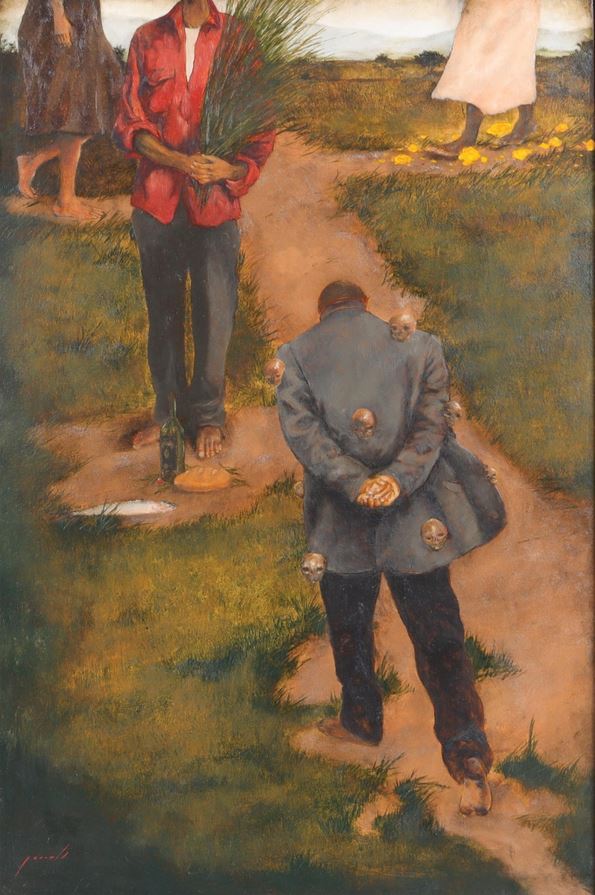Sports
by Ian C. Smith (May 2024)

Most school fights are hardly gladiatorial, wrestling promoted by non-combatant boys, agents provocateurs, jousting until the pinned contestant cedes. These rituals presage our futures, the ether through which we are about to plummet. Good at sport, disobedient, promiscuous for peer approval, I usually excel. Bob, inarticulate, strong, disapproving, catches the same bus as me, neither friend nor known enemy. Rash, I expect to beat him but am soon discomfited, my shame shielded within this milling circus from cruel teachers’ sight on this obscene campus.
Zigzagging through life like a bat, I read Bob’s name in my newspapers, remembering his ambition to be a cop. He shot a criminal dead in a suburban siege. Recalling our contest, I reflect how simply giving in had ended our immature foolishness. The years grind us. More news with his name, this time a wheat silo tragedy at his rural posting. Bob vainly attempted to rescue two boys from suffocation. Do distant echoes blister his quiet moments, the price we sometimes pay for following our stars?
Another time I am a youthful best man at a wedding. Exiting the church, I escort the maid-of-honour to the gaiety of Mendelssohn. Her husband, Tas, is a well-known sportsman I want to meet and then show-off, namedropping. We are to link up with him at a small private post-nuptial party when he returns from competing out of town. Before heading our way he celebrates victory with teammates at a bar. Driving back he strikes and kills a pedestrian. Our proposed drinks rendezvous falls apart like my friendship with the groom and his marriage later.
The wedding’s fragmented events, its thunderbolt aftermath, though vivid then, dimmed as time did its relentless thing. On a yacht years later I think about that day’s dark cloud of news, hoping lights like low-slung stars come on soon, one by one, dappling the harbour. Late docking, my thoughts also of a warm hotel, wreck charts curled, awash, but holding our course, we share a shell facing massed waves’ sheer black walls. The unskilled crew member, I join in with the shark jokes, hopefully masking my nervous fear, come through unscathed.
My youngest, Jed, not yet thirteen, nor five feet tall, steps up a grade for his first cricket match with and against men and older boys, later regaling me with a run through of how well he debuted. Even breaking his eBay bat becomes a highlight, along with how he almost gets a guy out, his throw missing by the narrowest of margins, he reports, fiercely frowning at the reducing gap between his index fingers.
When he was twenty, Jed flew overseas alone to New York, then travelled by Greyhound buses to other U.S. cities. My concern for his safety, his naivety, lingers now although he is older, extensively tattooed—for which his mother blames me—crossing Europe with mates and their girlfriends whose eyelashes vie with the guys’ muscles for exaggeration supremacy. They compete in international sporting events that are dangerous, acting as if bulletproof of course, striving to emulate social media celebrities.
I once aspired daydreamily to become an old warrior before we gather at the quiet shore, questing over, not an old worrier. Who knows what the future holds? We can’t spend our race against the clock in bomb shelters. Tracing my own wilful life I realise the only guarantee is we consort with risk, gambling with what we cherish lest darkness overtakes us sooner than we think.
Table of Contents
Ian C Smith‘s work has been published in BBC Radio 4 Sounds,Cable Street,The Dalhousie Review, Gargoyle, Griffith Review, Honest Ulsterman, Southword, & Stand. His seventh book is wonder sadness madness joy, Ginninderra (Port Adelaide). He writes in the Gippsland Lakes area of Victoria, and on Flinders Island.